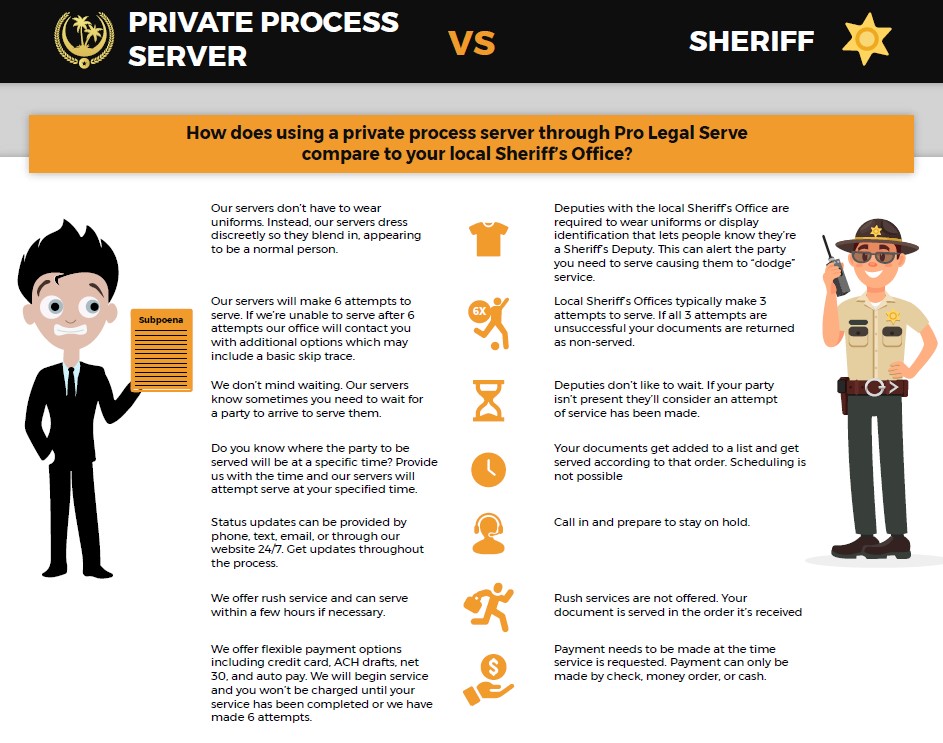Refine Offering: A Critical Action in Lawful File Shipment
Process serving plays an essential role in the legal framework, making certain that all celebrations are properly notified of pending lawful actions. This practice not only upholds the tenets of due procedure but additionally alleviates potential disputes that may develop from inadequate notification. Various kinds of legal records are served, each with its very own implications and demands. The procedure is fraught with difficulties that can make complex matters substantially. Understanding the nuances of these obstacles is vital, as they can have extensive implications for the stability of lawful proceedings. What lies under these complexities?
Importance of Process Serving
Process serving is an important part of the lawful system, working as the formal means by which individuals are notified of lawsuits entailing them. This treatment is vital as it makes sure that all celebrations obtain correct notification, consequently maintaining the principles of due process and fair depiction in lawful procedures. Without effective procedure offering, individuals may continue to be not aware of lawsuits, potentially leading to judgments made in their absence and serious consequences.
The relevance of procedure serving extends past simple notification; it additionally adds to the stability and efficiency of the judicial system. Effectively offered files enable prompt reactions from the events included, helping with the development of situations through the courts. In addition, adherence to legal needs surrounding procedure serving minimizes the opportunities of disputes pertaining to service, thereby minimizing delays in lawful proceedings.
Additionally, process offering offers as a necessary protect versus frivolous claims. By ensuring that accuseds recognize insurance claims versus them, it assists to hinder unwarranted activities and encourages accountable lawful practices. Eventually, the duty of process serving is fundamental in maintaining the guideline of regulation and ensuring that justice is easily accessible to all individuals associated with lawful issues.
Kinds of Lawful Documents Served
Lawful records served in the context of process serving include a vast array of materials crucial for numerous sorts of lawsuit. Process Serving. These papers can consist of summons, subpoenas, problems, and writs, each serving an unique function in the lawful procedure
A summons is commonly issued to notify a defendant of a lawsuit and oblige their appearance in court. Grievances, on the other hand, detail the plaintiff's situation and the relief sought. Subpoenas are vital for engaging witnesses to affirm or create evidence, thus playing an important role in the discovery procedure. Writs can consist of numerous kinds of court orders, such as writs of garnishment or expulsion, which guide certain actions to be taken.
Along with these key records, process-server may additionally provide testimonies, notices, or motions, relying on the demands of the case. Each sort of file offered is regulated by particular lawful policies and treatments, highlighting the importance of exact and timely solution. Ultimately, the reliable delivery of these lawful documents is critical in making sure that all parties are notified which the judicial process can continue right away.
Obstacles Faced by Process Servers
Countless challenges challenge process-server in the implementation of their responsibilities, often complicating a currently intricate legal landscape. One substantial hurdle is finding people that are evasive or intentionally staying clear of service. This typically calls for comprehensive investigatory abilities and sources, check these guys out as process-server need to browse incorrect addresses and limited info.
Additionally, procedure web servers frequently experience aggressive scenarios. Offering documents can provoke defensive reactions from recipients, causing battles that jeopardize the server's safety. Legal protections for process servers vary by jurisdiction, adding one more layer of intricacy to their job.
Time restrictions additionally present a crucial challenge. Lots of lawful records have stringent deadlines, and falling short to serve them in a timely manner can result in severe lawful repercussions for customers. This stress can be worsened by the demand to follow certain guidelines regulating solution techniques.

Refine Serving Approaches
Exactly how do process-server efficiently make certain that legal documents reach their desired recipients? The approaches employed in procedure serving are critical for the successful delivery of these papers. The most typical approach is individual solution, where the process web server hands the files straight to the recipient. This method is liked for its reliability, as it supplies a clear document of delivery.
In enhancement to individual service, alternate techniques such as replaced service can be used. This includes supplying documents to a person of appropriate age and discernment at the recipient's home or organization, guaranteeing that the papers get to the desired party indirectly - Process Serving. One more technique is solution by mail, which might be allowed in particular jurisdictions, allowing files to be sent by means of licensed or signed up mail to offer evidence of shipment
Lastly, digital service is getting traction, specifically in situations where conventional techniques may verify challenging. This can include emailing records or utilizing court-approved electronic filing systems. Each technique has its own set of guidelines and policies, making it important for process-server to be well-informed about the legal needs in their territory to make certain conformity.
Legal Repercussions of Improper Service
When process offering is not implemented effectively, considerable legal repercussions can arise, threatening the legitimacy of the whole legal proceeding. Inappropriate solution can result in a dismissal of the instance, as the court might identify that the defendant was not properly informed of the lawsuit against them. Process Serving. This termination can happen even if the complainant has a strong case, properly squashing their efforts and sources bought the litigation process
In addition, incorrect solution may result in hold-ups, triggering further difficulties in the legal timeline. If a defendant is not appropriately served, they might not recognize their commitment to respond, leading to defaults that make complex the resolution of the case. In some territories, the Homepage complainant may be called for to re-initiate the service procedure, incurring added costs and expanding the timeline of the case.
In addition, repeated failings in service can show poorly on the plaintiff's lawful guidance, possibly resulting in expert effects or sanctions. Consequently, guaranteeing correct process serving is not just a procedural demand yet a vital part that supports the stability of the lawful system and protects the legal rights of all events involved.

Verdict
In conclusion, process serving plays an essential role in the legal system by guaranteeing that all parties receive proper notification of legal activities. The numerous sorts of papers served, coupled with the challenges faced by procedure web servers, highlight the intricacies intrinsic in this occupation. Employing appropriate methods of solution is critical to maintain due process, and any failure to stick to lawful requirements can lead to significant effects, weakening the integrity of judicial proceedings.
Refine serving plays an essential duty in the lawful framework, ensuring that all events are properly notified of pending lawful actions.Process serving is a crucial component of the lawful system, serving as the official ways by which people are informed of legal activities involving them. In addition, adherence to legal needs surrounding procedure serving decreases the possibilities of disputes relating to service, therefore decreasing hold-ups in lawful procedures.
When process offering is not executed appropriately, significant lawful repercussions can develop, undermining the credibility of the whole legal case.In conclusion, process offering plays an important duty in the legal system by making sure that all parties get correct notification of legal activities.